Sally Murphy's Blog, page 18
December 31, 2021
What I Read in December
It’s the last day of the month, so time to look at what I read in December. And, of course, since it’s also the last day of the year, to look back over he whole year.
First, I managed 10 books in the busyness of December.
Books for Children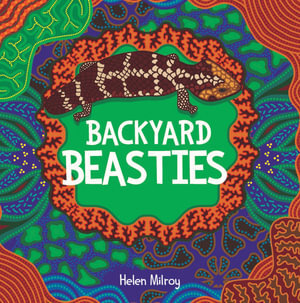 Backyard Beasties, by Helen Milroy (Fremantle Press, 2022). I received this as a review copy from the publisher, and was delighted when I opened the package, having loved the first two Backyard book, Backyard Birds and Backyard Bugs. Like the others, the simple rhyming text is a pleasure to read aloud and the illustrations are rich. A mixture of native and domestic beasts are found – including a dog, a gecko and a possum.
Backyard Beasties, by Helen Milroy (Fremantle Press, 2022). I received this as a review copy from the publisher, and was delighted when I opened the package, having loved the first two Backyard book, Backyard Birds and Backyard Bugs. Like the others, the simple rhyming text is a pleasure to read aloud and the illustrations are rich. A mixture of native and domestic beasts are found – including a dog, a gecko and a possum.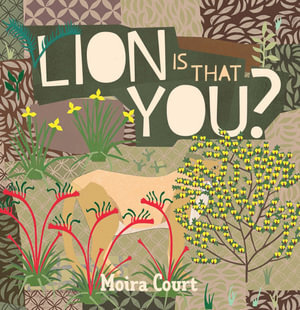 Lion is That You? by Moira Court (Fremantle Press, 2022). And another review copy, again looking for animals. In this case, the reader is taken on a hunt to see if there are really lions in the Australian bush, a nod to various legends that escaped big cats have survived in the bush. Instead, there are range of Australian animals to spot – a kangaroo, a quenda, a dugite and more. I’m looking forward to sharing this one with my grandies, who do love animal books, and rhyme.
Lion is That You? by Moira Court (Fremantle Press, 2022). And another review copy, again looking for animals. In this case, the reader is taken on a hunt to see if there are really lions in the Australian bush, a nod to various legends that escaped big cats have survived in the bush. Instead, there are range of Australian animals to spot – a kangaroo, a quenda, a dugite and more. I’m looking forward to sharing this one with my grandies, who do love animal books, and rhyme.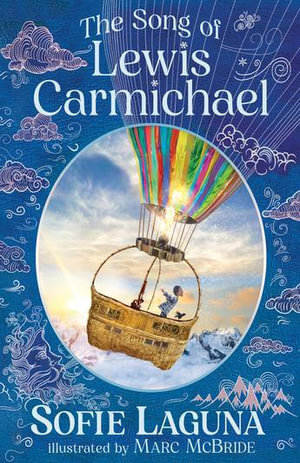 The Song of Lewis Carmichael, by Sofie Laguna, illustrated by Marc McBride (Allen & Uniwn, 2021). A lovely adventure story. Matthew is timid and his parents worry about him. A lot. But in a magical adventure lead by a crow named Lewis Carmichael, Matthew journeys to the North Pole, learning a lot about his own strength along the way.
The Song of Lewis Carmichael, by Sofie Laguna, illustrated by Marc McBride (Allen & Uniwn, 2021). A lovely adventure story. Matthew is timid and his parents worry about him. A lot. But in a magical adventure lead by a crow named Lewis Carmichael, Matthew journeys to the North Pole, learning a lot about his own strength along the way.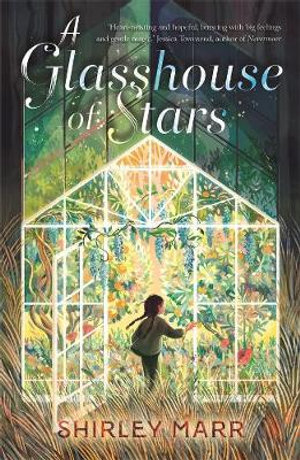 A Glasshouse of Stars, by Shirley Marr (Puffin Books, 2021). This is a simply beautiful book, in spite of – or perhaps because of – dealing with some difficult events. Meixing is a young girl dealing with tragedy, change and displacement, living in a New House in the New Land, and a combination of inexplicable magic and her own courage help her to navigate a way.
A Glasshouse of Stars, by Shirley Marr (Puffin Books, 2021). This is a simply beautiful book, in spite of – or perhaps because of – dealing with some difficult events. Meixing is a young girl dealing with tragedy, change and displacement, living in a New House in the New Land, and a combination of inexplicable magic and her own courage help her to navigate a way. 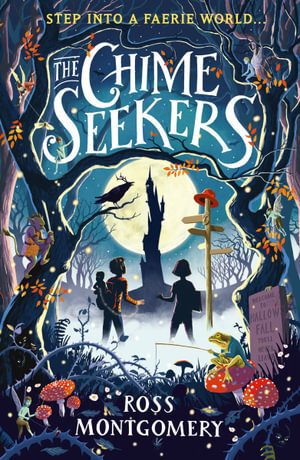 The Chime Seekers, by Ross Montgomery (Walker Books, 2021). Yanni is really unimpressed with his baby sister, and the way her presence has changed his life. But when an evil faerie steals her on Halloween, he realises how important she is – and only he and his cousin Amy can save her.Books for AdultsThe Sign of Four, by Arthur Conan Doyle (Audible). The second book featuring Sherlock Holmes and continuing my listening to the collection, read by the inimitable Stephen Fry.
The Chime Seekers, by Ross Montgomery (Walker Books, 2021). Yanni is really unimpressed with his baby sister, and the way her presence has changed his life. But when an evil faerie steals her on Halloween, he realises how important she is – and only he and his cousin Amy can save her.Books for AdultsThe Sign of Four, by Arthur Conan Doyle (Audible). The second book featuring Sherlock Holmes and continuing my listening to the collection, read by the inimitable Stephen Fry.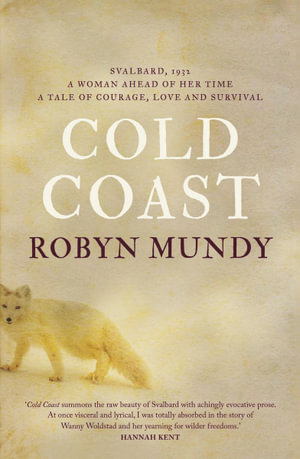 Cold Coast, by Robyn Mundy (Ultimo Press, 2021). I love Robyn Mundy’s writing and she has made stories set amongst the wildest, coldest parts of the world a specialty – reflective of her love of these places. this one is set in Norway, in remote Svalbard and a fictionalised account of Wanny Woldstad, who in 1932 wintered as a trapper. The beauty of the natural world, the perils of humans living there, and the realities of trapping and hunting are woven together in this exquisite novel.
Cold Coast, by Robyn Mundy (Ultimo Press, 2021). I love Robyn Mundy’s writing and she has made stories set amongst the wildest, coldest parts of the world a specialty – reflective of her love of these places. this one is set in Norway, in remote Svalbard and a fictionalised account of Wanny Woldstad, who in 1932 wintered as a trapper. The beauty of the natural world, the perils of humans living there, and the realities of trapping and hunting are woven together in this exquisite novel.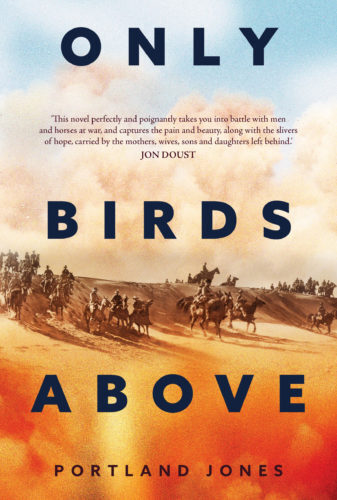 Only Birds Above, by Portland Jones (Fremantle Press, 2022). This one is a review copy, so not out until; 2022. Historical fiction, one of my favourite genres, and exploring the generational impact of war, set in both WW1 and WW2, with a father fighting for the 10th Light Horse and a son a prisoner of war in Sumatra. Not a happy story, but well drawn.The Adventures of Sherlock Holmes, by Arthur Conan Doyle (Audible). The third book in the definite collection of Sherlock Holmes stories. I look forward to working my way through the remainder in 2022.Poetry
Only Birds Above, by Portland Jones (Fremantle Press, 2022). This one is a review copy, so not out until; 2022. Historical fiction, one of my favourite genres, and exploring the generational impact of war, set in both WW1 and WW2, with a father fighting for the 10th Light Horse and a son a prisoner of war in Sumatra. Not a happy story, but well drawn.The Adventures of Sherlock Holmes, by Arthur Conan Doyle (Audible). The third book in the definite collection of Sherlock Holmes stories. I look forward to working my way through the remainder in 2022.Poetry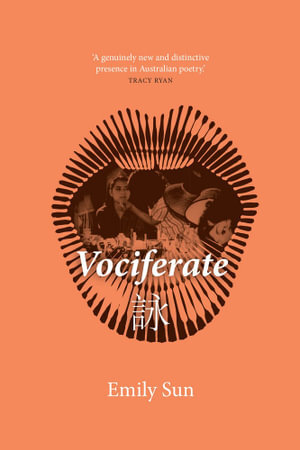 Vociferate, by Emily Sun (Fremantle Press, 2021). This took me a little while to get through because, like the best poetry collections, it needed to be savoured, so I dipped into it over several weeks. Lots to ponder and consider, with its exploration of belonging and identity.
Vociferate, by Emily Sun (Fremantle Press, 2021). This took me a little while to get through because, like the best poetry collections, it needed to be savoured, so I dipped into it over several weeks. Lots to ponder and consider, with its exploration of belonging and identity.
So, these ten bring me to a total for 2021 of 153, including my many loves – picture books, children’s books, poetry, fiction, nonfiction.
I have seen lots of friends posting their favourite reads for the year on their blogs or on social media, but can’t bring myself to do this, because I know I will miss something. Every book I finish offers something special. But one thing I really enjoyed this year was rediscovering some of my old childhood favourites and also working through some of the eclectic offerings that my to-read pile, which dates back years, has afforded.
For 2022, I am not yet decided if I will keep posting this monthly list. I like that it keeps track of my reading, and offers a chance to share my thoughts. But there are other ways of doing this, and today I have downloaded an app called Story Graph, which I will experiment with in January before deciding whether to do that instead of blogging, or to do both, or to just keep up with the monthly blog.
In the meantime, Happy Yew Year to you. I hope 202 has offered you some reading joy, and that 2022 offers even more.
November 30, 2021
What I Read in November
Another month has ended, which means another round up of what I have been reading. Also another month where my total was 12 books. This brings me to 143, only 7 shy of my target of 150. I think I can do it! Here’s what I read in November:
Books for ChildrenWell, Really, Mr Twiddle! by Enid Blyton (Dean & Son, 1968). This was a childhood favourite and I still own the copy I think I got for a birthday. There is always a risk revisiting a childhood favourite, but even though it is dated, I still found plenty to smile about.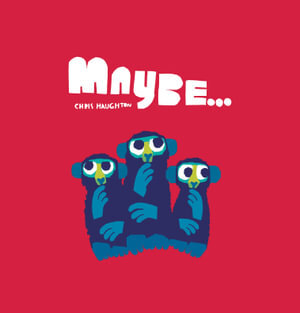 Maybe… by Chris Haughton (Walker Books, 2021). This picture book came from the publisher as a review copy. Who doesn’t love a monkey story? In this one the young monkeys are told not to go near the mango tree because there are tigers around – but can’t help wondering if maybe they could just take a look. Lots of fun and a bit of a lesson (maybe).
Maybe… by Chris Haughton (Walker Books, 2021). This picture book came from the publisher as a review copy. Who doesn’t love a monkey story? In this one the young monkeys are told not to go near the mango tree because there are tigers around – but can’t help wondering if maybe they could just take a look. Lots of fun and a bit of a lesson (maybe).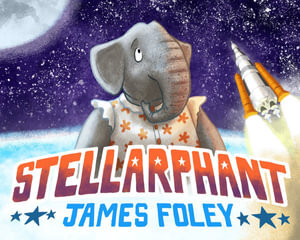 Stellarphant, by James Foley (Fremantle Press, 2021). Another review copy. I adore the work of James Foley, and this one didn’t disappoint. The story of Stella, an elephant who wants to be an astronaut but keeps being told she can’t – even when she meets the requirements – is funny but also uplifting. The messages here about working towards goals, overcoming prejudice and acceptance are wonderfully couched.
Stellarphant, by James Foley (Fremantle Press, 2021). Another review copy. I adore the work of James Foley, and this one didn’t disappoint. The story of Stella, an elephant who wants to be an astronaut but keeps being told she can’t – even when she meets the requirements – is funny but also uplifting. The messages here about working towards goals, overcoming prejudice and acceptance are wonderfully couched.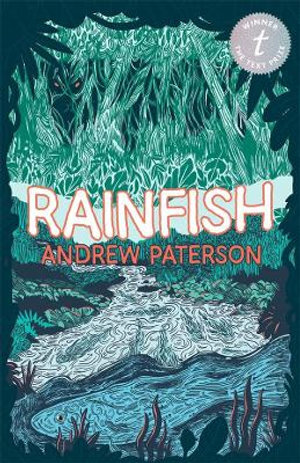 Rainfish, by Andrew Paterson (Text, 2021). This one won the Text prize, and I can see why. It’s beautiful, sad, even humorous, all rolled into one. The story of Aaron, who finds himself an accomplice to a crime and spends his summer living in dread of being caught, but not knowing how to put things to right.The Reluctant Dragon, by Kenneth Graeme (Audible). By the author of Wind in the Willows, I hadn’t read this one before, but downloaded it from Audible and listened while doing some house work – which made the work bearable. When I was at school we learnt a song called The Reluctant Dragon, which I can still sing by heart – and I presume the song was inspired by the book. Either way, I am now singing the song anew.
Rainfish, by Andrew Paterson (Text, 2021). This one won the Text prize, and I can see why. It’s beautiful, sad, even humorous, all rolled into one. The story of Aaron, who finds himself an accomplice to a crime and spends his summer living in dread of being caught, but not knowing how to put things to right.The Reluctant Dragon, by Kenneth Graeme (Audible). By the author of Wind in the Willows, I hadn’t read this one before, but downloaded it from Audible and listened while doing some house work – which made the work bearable. When I was at school we learnt a song called The Reluctant Dragon, which I can still sing by heart – and I presume the song was inspired by the book. Either way, I am now singing the song anew.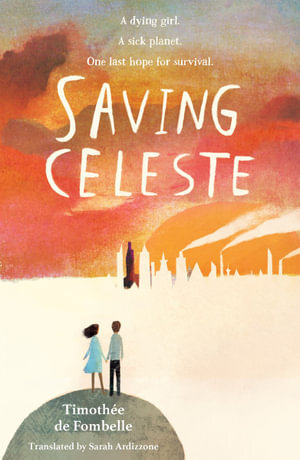 Saving Celeste, by Timothee de Fombelle, translated by Sarah Ardizzone (Walker Books 2021). This came as a review copy from Walker Books and is a touching fable about two children fighting for a better world in a dystopian near future. A story of hope.
Saving Celeste, by Timothee de Fombelle, translated by Sarah Ardizzone (Walker Books 2021). This came as a review copy from Walker Books and is a touching fable about two children fighting for a better world in a dystopian near future. A story of hope.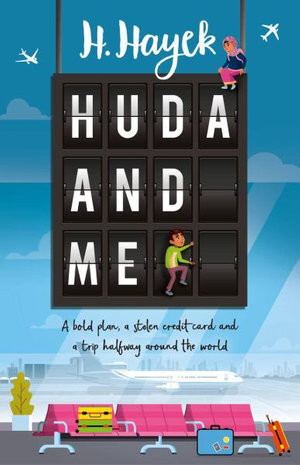 Huda and Me, by H. Hayek (Allen & Unwin,2021)Told through the eyes of twelve year old Akeal, as he accompanies his little sister Huda on a bold mission to reach their parents on the other side of the world. Their parents have had to travel to Beirut to be with family, leaving Akeal and his six siblings with an evil babysitter. It is Huda who finds a way to travel across the world and let their parents know what is happening. I enjoyed this – funny, heart warming and intriguing.
Huda and Me, by H. Hayek (Allen & Unwin,2021)Told through the eyes of twelve year old Akeal, as he accompanies his little sister Huda on a bold mission to reach their parents on the other side of the world. Their parents have had to travel to Beirut to be with family, leaving Akeal and his six siblings with an evil babysitter. It is Huda who finds a way to travel across the world and let their parents know what is happening. I enjoyed this – funny, heart warming and intriguing.Books for Adults
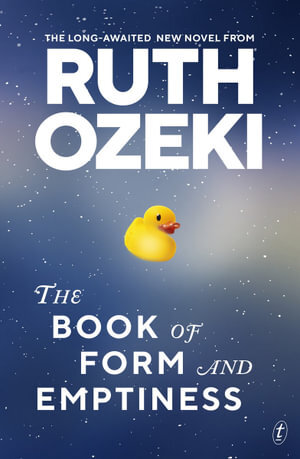 The Book of Form and Emptiness, by Ruth Ozeki (Text Publishing, 2021). I picked this one up on the basis of both the title and the duck on the cover. They drew me in and, even though I knew it was fiction, I was surprised by just how odd this book i, with the book itself being one of the narrators, alongside the main character, Benny who, in his early teens is struggling with the death of his father. Hard to sum up in a few lines, but although it took me a while, I did enjoy this, compelled to keep reading, as Benny and his mother struggle through some terrible times.
The Book of Form and Emptiness, by Ruth Ozeki (Text Publishing, 2021). I picked this one up on the basis of both the title and the duck on the cover. They drew me in and, even though I knew it was fiction, I was surprised by just how odd this book i, with the book itself being one of the narrators, alongside the main character, Benny who, in his early teens is struggling with the death of his father. Hard to sum up in a few lines, but although it took me a while, I did enjoy this, compelled to keep reading, as Benny and his mother struggle through some terrible times.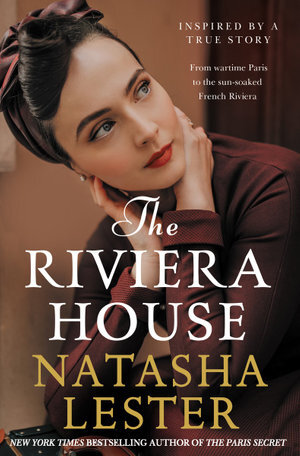 The Riviera House, by Natasha Lester (Hachette, 2021). It had been a while since I read any of Lester’s work, and it was a pleasure to reengage. Set in Paris in WW2, as well as on the Riviera in modern times, this is an absorbing tale, well woven.
The Riviera House, by Natasha Lester (Hachette, 2021). It had been a while since I read any of Lester’s work, and it was a pleasure to reengage. Set in Paris in WW2, as well as on the Riviera in modern times, this is an absorbing tale, well woven.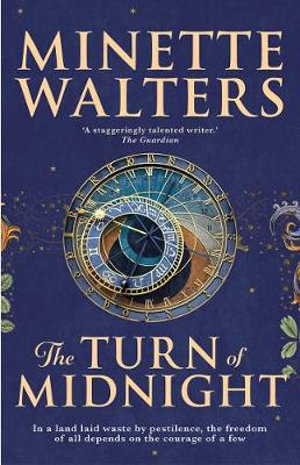 The Turn of Midnight, by Minette Walters. (Allen & Unwin, 2018). I picked this up not knowing it was a sequel, and would have preferred to read the prequel (The Last Hours) first, but still enjoyed this. Set in 1349 as the Black Death devastates communities across England, with a strong, wise woman guiding her community assisted by an educated serf. Lots of action and intrigue.
The Turn of Midnight, by Minette Walters. (Allen & Unwin, 2018). I picked this up not knowing it was a sequel, and would have preferred to read the prequel (The Last Hours) first, but still enjoyed this. Set in 1349 as the Black Death devastates communities across England, with a strong, wise woman guiding her community assisted by an educated serf. Lots of action and intrigue.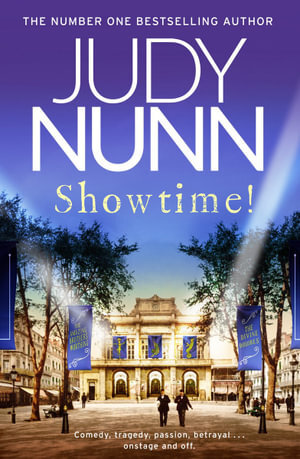 Showtime! by Judy Nunn (Random House, 2021). I really enjoyed this saga, set in the golden age of Australian showbusiness – the late 19th and early 20th centuries, and following the lives of two showbusiness families.
Showtime! by Judy Nunn (Random House, 2021). I really enjoyed this saga, set in the golden age of Australian showbusiness – the late 19th and early 20th centuries, and following the lives of two showbusiness families.
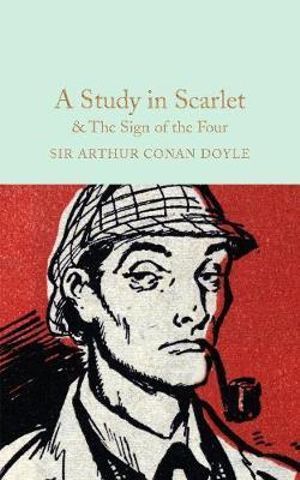 A Study in Scarlet, by Arthur Conan Doyle (Audible edition). I downloaded the collection of Sherlock Holmes books read by Stephen Fry several months ago, but have only just got around to listening. I don’t know why I waited – anything read by Stephen Fry is a treat. I’ll be listening to the rest for sure.
A Study in Scarlet, by Arthur Conan Doyle (Audible edition). I downloaded the collection of Sherlock Holmes books read by Stephen Fry several months ago, but have only just got around to listening. I don’t know why I waited – anything read by Stephen Fry is a treat. I’ll be listening to the rest for sure.Off to get reading, to ensure I reach that 150 by the end of the year. What have you been reading?
November 25, 2021
Poetry Friday: Celebrating Aussie Verse Novels
If you know anything about me, you probably know that I love poetry, and that I super really especially love verse novels. SO it was really lovely yesterday to attend the launch of a wonderful new resource focussed on Australian verse novels.
The Australian Verse Novel Resource was put together by staff and volunteers of the National Centre for Australian Children’s Literature – and I was one of the volunteers, as was my friend and fellow verse novelist Kat Apel. Over the past two years our small group of four read every Australian verse novel ever published for children or young adults (including many which were published during the project – they just kept coming!) and we created a resource which doesn’t just list these books but offers a deep dive into them – including a brief summary of each, listing of awards, links to teacher’s notes, reviews and other resources, curriculum links and key topics covered.
Who is the resource for? YOU! It’s for:
readersteacherslibrariansresearcherschildren’s literature loverspoetry fansand people who have no idea what a verse novel is but want to find out.
Broken into two sections – one for novels for younger readers and one for older, you will find the resource here at this link.
Back to the launch – it was amazing to gather (albeit virtually) with other verse novelists, including Kat, Steven Herrick and Lorraine Marwood, and children’s literature enthusiasts, to hear Jackie French OAM speak so passionately about poetry and verse novels, and the difference they can make.
Jackie read from some of my favourite verse novels, including work by Steven Herrick, Pip Harry and Charmaine Papertalk Green. This to me is one my favourite things about verse novels – they are really are designed to be read aloud because, as Jackie says, one thing verse novels have in common is the way the voice speaks directly to the reader.
So, for my own little celebration of the launch, here is a video of me reading from Pearl Verses the World
Happy Poetry Friday! I’m off to check out the other poetry goodness around the blogosphere. Ruth will be hosting the roundup, so you can come along for the ride.
November 18, 2021
Poetry Friday: Of Failures, Bikes and Islands
This week I’ve been thinking of failure. It’s one of my biggest fears – that I will start something and not finish, or, finish but not finish well. Which I know is silly – because it’s more of a failure to not have a go than it is to start and learn from the experience. History shows lots and lots of failures that lead to learning and, ultimately, success.
Still, I can tell you about a lot of failures going right back to my childhood that I sometimes still carry with me. And it’s one of those that I’ve especially been thinking about.
When I was 7 my Mum very patiently taught me to ride a bike. I was a little young and uncoordinated to go from not being able to ride anything more than a tricycle to independently riding sans training wheels, but there was a reason – we were off to Rottnest Island for a family holiday. And, on Rottnest, the chief way to get around is by bike.
So Mum taught me to ride up and down the laneway at home, and, when we got to Rottnest, a bike was hired for me, along with every other member of the family. I was still a novice rider – and had yet to experience the joy of hill climbing – or descents – and was not too good at using the foot brakes which most bikes had back in the 1970s.
You might see where this is heading. All went well the first day or so, but then we rode to the top of the tallest hill on the island, probably to see the lighthouse which is there. My memory is hazy on what we did on the hill, and I have no memory of riding up the hill. But what I do recall, very vividly, is riding down. A steep descent, picking up speed and going from feeling excited to realising I was losing control. Time to apply the brakes. Nothing happened. My family, behind me, calling out ‘brake, Sally, brake!’ But the brakes weren’t working and I was panicking. It didn’t end well. Very soon I was in a bush at the side of the road, and my bike was on the ground.
I wasn’t terribly injured, but I was rapidly surrounded by my siblings and parents, who, once they realised I was okay alternated between laughter and asking ‘why didn’t you use the brakes?’
‘They wouldn’t work’ I sobbed.
It was fairly quickly established that the brakes were fine – but, in my panic I was pushing the pedals forward instead of back.
This failure might have been quickly forgotten but for two things – for the rest of the holiday I was banned from riding any distance, and had, instead, to ride in the baby seat on the back of Mum’s bike. The humiliation! I was seven! And then, not just for the rest of the holiday but the rest of my life, every time that holiday was mentioned, the story of me careening out of control down the hill to the cries of ‘brake, Sally, brake’ was told. And retold. With everyone laughing except me. When you are the butt of a funny story you don’t always see the humour – especially when it reminds you of a failure. (As an aside, it amazes me that my fall has been immortalised on yellow signs on the island)
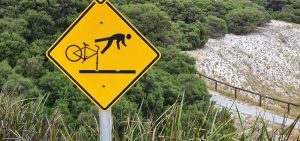
BUT this story has a postscript. I have been coming to Rottnest a lot over the last few years. And, at first, I was very reluctant to hire a bike. Too many memories. But gradually I realised I was missing out on a lot. In February, for the first time, I finally hired a bike, and loved it. And yesterday, back on Rottnest, I rode to the lighthouse – and successfully rode down it! And then I rode to the top of the second highest hill and rode down that too.
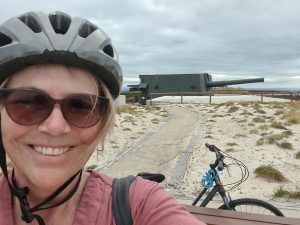
The smile I had coming down was as big as it would have been if I was till 7 – maybe bigger.
And, of course, I realised that some failures are temporary. Sometimes the next day, the next week, the next month, other times 40 plus years later, another try gets a better result.
I’m going to try to remember that the next time I feel I’ve failed.
In the meantime, since it’s Poetry Friday, here’s a poem I wrote some time ago in celebration of bikes (and hills).
Hills
Going uphill on a bike
Is tough.
Really tough.
Muscles strain
Legs burn
Each push of the pedals
Gains an inch –
If I’m lucky.
Up out of the seat
Pushing, urging, groaning.
Thighs tight
Eyes yearn
Searching for the peak
Will it ever end?
BUT
Going downhill on a bike
Is fun
Really fun
Pedals turn
Of their accord
Lean back
Arms off handlebars
Look at me!
The bottom comes too soon.
(Copyright Sally Murphy)
And, in case you think I came to Rottnest without snorkelling, here’s a little glimpse under the sea.
Poetry Friday today is hosted by Carol. Pop over later and see what other poetry successes are being shared.
November 7, 2021
What I Read in October
How did it get to be November already? Another month has just whizzed past, which means it’s time to look at what I read in October. Here goes:
Books for Younger Readers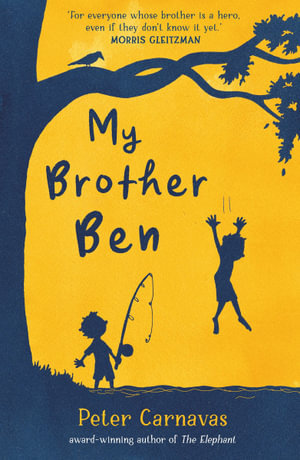 My Brother Ben, by Peter Carnavas (UQP, 2021). I love Peter’s writing, and only recently read his first novel, so was pleased to spot the new one in my local bookshop. True to form, this is gentle and lovely, focussed on the bonds between brothers, especially in the face of challenges.
My Brother Ben, by Peter Carnavas (UQP, 2021). I love Peter’s writing, and only recently read his first novel, so was pleased to spot the new one in my local bookshop. True to form, this is gentle and lovely, focussed on the bonds between brothers, especially in the face of challenges.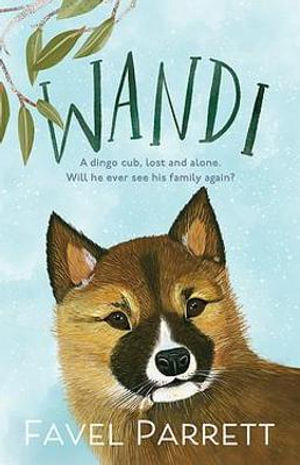 Wandi, by Favel Parrett (Lothian, 2021). I love animal stories, and what’s cuter than a baby dingo? Wandi is a rare alpine dingo, but when an eagle snatches him from his mountain home, a frightening adventure begins. Based on a true story, but told from the perspective of the dingo.
Wandi, by Favel Parrett (Lothian, 2021). I love animal stories, and what’s cuter than a baby dingo? Wandi is a rare alpine dingo, but when an eagle snatches him from his mountain home, a frightening adventure begins. Based on a true story, but told from the perspective of the dingo.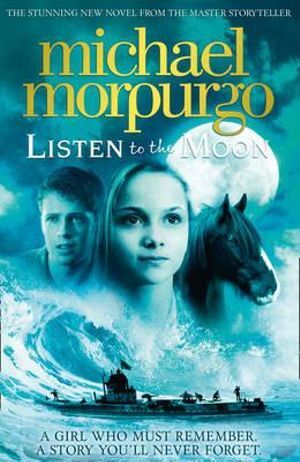 Listen to the Moon, by Michael Morpurgo (Harper Collins, 2015). I listened to this on audio, and it was a good one for that, with different readers for the viewpoints of Alfie, and Merry. Set in World War One, on the Scillie Islands, this is the story of a fishing family who find a girl alone on an uninhabited island and nurse her back to health, as well as the story of that girl, who they call Lucy, and how she came to be there.The Family from One End Street, by Eve Garnett (Heinemann, 1952). This book, first published in 1937, was a favourite in my childhood and, now that I realise just how old it is, I wonder if perhaps my mum read it as a child, too. I am fairly sure that, like most o my childhood favourites, it was Mum who bought it for me. I hadn’t read it for a very long time, but wasn’t disappointed.The Small Miracle, by Paul Gallico (Michael Joseph, 1951). I have had this little book for quite a while, and no idea how I came to own it – I suspect an op shop find. The story of an orphaned boy, his donkey, and his belief in St Francis of Assisi.Books for Young Adults
Listen to the Moon, by Michael Morpurgo (Harper Collins, 2015). I listened to this on audio, and it was a good one for that, with different readers for the viewpoints of Alfie, and Merry. Set in World War One, on the Scillie Islands, this is the story of a fishing family who find a girl alone on an uninhabited island and nurse her back to health, as well as the story of that girl, who they call Lucy, and how she came to be there.The Family from One End Street, by Eve Garnett (Heinemann, 1952). This book, first published in 1937, was a favourite in my childhood and, now that I realise just how old it is, I wonder if perhaps my mum read it as a child, too. I am fairly sure that, like most o my childhood favourites, it was Mum who bought it for me. I hadn’t read it for a very long time, but wasn’t disappointed.The Small Miracle, by Paul Gallico (Michael Joseph, 1951). I have had this little book for quite a while, and no idea how I came to own it – I suspect an op shop find. The story of an orphaned boy, his donkey, and his belief in St Francis of Assisi.Books for Young Adults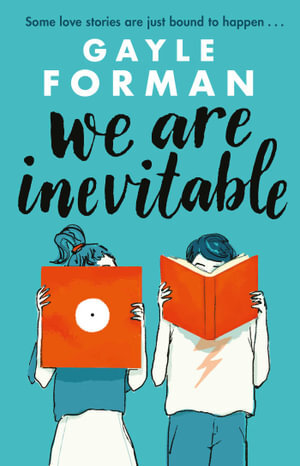 We Are Inevitable, by Gayle Forman (Simon & Schuster, 2021). If I pick up any book set in a bookshop I just have to read it. This one is set in a failing bookshop, run by Aaron and his father who are struggling to keep themselves functioning following a terrible loss. I enjoyed the mix of humour, action and healing.
We Are Inevitable, by Gayle Forman (Simon & Schuster, 2021). If I pick up any book set in a bookshop I just have to read it. This one is set in a failing bookshop, run by Aaron and his father who are struggling to keep themselves functioning following a terrible loss. I enjoyed the mix of humour, action and healing.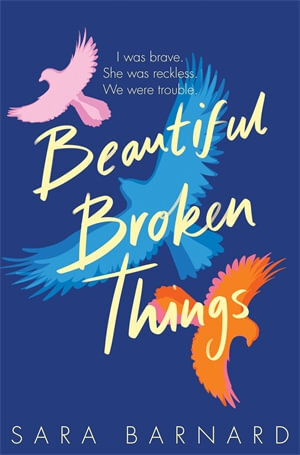 Beautiful Broken Things, by Sara Barnard (Macmillan, 2016). A story about friendship, and of living with the impact of trauma. Not a happily ever after story, but that’s what makes it believable, and there is plenty of hope.Books for Adults
Beautiful Broken Things, by Sara Barnard (Macmillan, 2016). A story about friendship, and of living with the impact of trauma. Not a happily ever after story, but that’s what makes it believable, and there is plenty of hope.Books for Adults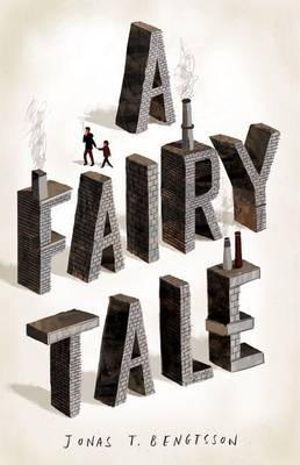 A Fairy Tale, by Jonas T. Bengtsson (Scribe, 2014). Hard to describe this one, which was a library discard which I picked up in a op shop. Set in Copenhagen in the 1980s, it is the story of a father and son who live an unorthodox life, moving from place to place with the father seemingly trying to escape his past. Told through the eyes of the boy – first as a child and later as a young man, this is a really intriguing story about fathers, sons and their bods.
A Fairy Tale, by Jonas T. Bengtsson (Scribe, 2014). Hard to describe this one, which was a library discard which I picked up in a op shop. Set in Copenhagen in the 1980s, it is the story of a father and son who live an unorthodox life, moving from place to place with the father seemingly trying to escape his past. Told through the eyes of the boy – first as a child and later as a young man, this is a really intriguing story about fathers, sons and their bods. 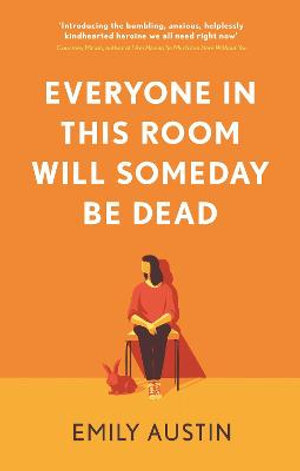 Everyone in this Room Will Some Day be Dead, by Emily Austin (Atlantic Books, 2021). I seem to have read book after book this book around death and dying – murder mysteries, grief etc. Which is odd because I was looking for lighter reads. This one was a favourite. Gilda is a little obsessed with death and illness, but does not expect this to lead her on an amateur quest to solve an apparent murder. But not did she, as a gay atheist, expect to be hired as the receptionist at a local Catholic church. By turns sad, funny and intriguing.
Everyone in this Room Will Some Day be Dead, by Emily Austin (Atlantic Books, 2021). I seem to have read book after book this book around death and dying – murder mysteries, grief etc. Which is odd because I was looking for lighter reads. This one was a favourite. Gilda is a little obsessed with death and illness, but does not expect this to lead her on an amateur quest to solve an apparent murder. But not did she, as a gay atheist, expect to be hired as the receptionist at a local Catholic church. By turns sad, funny and intriguing. 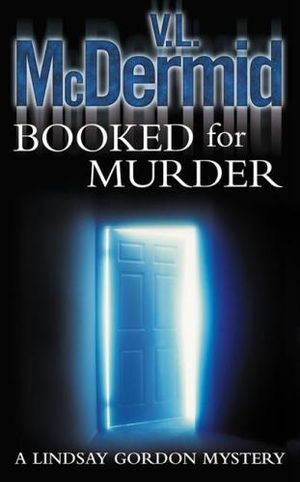 Booked for Murder, by V .L. McDermid (Harper Collins, 1996). Another op shop purchase – this one a murder mystery. I bought it on the strength of the premise – an author who is murdered by the same device she has written in her as-yet forthcoming book. Quite a few twists, and I liked the protagonist.
Booked for Murder, by V .L. McDermid (Harper Collins, 1996). Another op shop purchase – this one a murder mystery. I bought it on the strength of the premise – an author who is murdered by the same device she has written in her as-yet forthcoming book. Quite a few twists, and I liked the protagonist.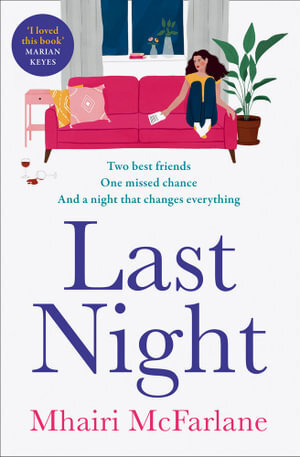 Last Night, by Mhairi McFarlane (Harper Collins, 2021) And yes, another book that was not as light as I thought it would be – there’s grief, family secrets and more being dealt with, but there also light, feel good moments. I hadn’t read anything by McFarlane before, but will be looking out for more.
Last Night, by Mhairi McFarlane (Harper Collins, 2021) And yes, another book that was not as light as I thought it would be – there’s grief, family secrets and more being dealt with, but there also light, feel good moments. I hadn’t read anything by McFarlane before, but will be looking out for more.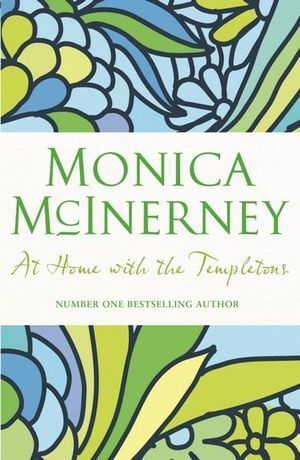 At Home With the Templetons, by Monica McInerney (Penguin, 2010). Another op shop purchase. Set between London and Australia, following a dysfunctional family who seemingly inherit a heritage home in Australia and set it up as a tourist attraction. Part family saga, part romance. Not heavy going, and thus just what I needed.
At Home With the Templetons, by Monica McInerney (Penguin, 2010). Another op shop purchase. Set between London and Australia, following a dysfunctional family who seemingly inherit a heritage home in Australia and set it up as a tourist attraction. Part family saga, part romance. Not heavy going, and thus just what I needed.
12 books, bringing my total for 2021 (to date) to 131. I am still hoping to get to 150 by the end of the year – 19 to go.
What have you been reading?
September 30, 2021
Poetry Friday: Metamorphosis Poems
It’s Poetry Friday which means it’s the day when bloggers from all over share poems and poetry fun. I started 2021 very keen to do this every week – and have not done very well at that goal. But today is the day to try to get back on track.
One of the reasons I have been so busy this year is that, in the space just a few months, I was asked to create a resource for teachers to teach poetry, then wrote and compiled that resource and – voila – it was published. A big rush to get there, but I am really happy that schools all over Australia have now got this book, and hopefully are finding new ways to share poetry in their classrooms. If you haven’t yet admired the beautiful cover, here it is again: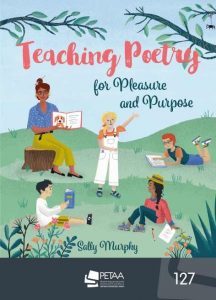
(You can find out more about this book, here at the PETAA website)
One of my goals for this book was to share a range of poetry forms which can be used in the classroom. Some of the forms are new but others are better known – with my own little twist.
One of those forms is the diamante – a commonly known form using seven lines (explained by Kenn Nesbitt here). I started with the diamante, changed the rules and created Metamorphosis Poetry. Here’s an example:
FrogTadpole
fishy tail
swim wiggle squirm
growing legs and lungs
climbing onto land
hopping free
Frog
(copyright Sally Murphy, 2021)Can you see why I called it a metamorphosis poem? That’s right- because it follows the transformation (metamorphosis) of a tadpole into a frog. It doesn’t follow the strict form of the diamante – which specifies word classes for each line (nouns, then adjectives, then verbs and so on). Instead the pattern here is only around numbers of words – except for the first and final line, which move from juvenile to adult:
Line one: one word – the juvenile form
Line two: two words
Line three: three words
Line four: four words
Line five: three words
Line six: two word
Line seven – one word – the adult form
This could be replicated with other animals which metamorphose (caterpillar/butterfly; grub/beetle,; larva/salamander. BUT, you could equally move outside of the animal world to write about other transformations. Like this:
PoemThought
tickling mind
forming phrases, patterns
demanding my writerly attention
lines, verses, stanzas
pencil flying
poem
(copyright Sally Murphy, 2021)Other pairs that come to mind are story/book, bricks/house or tune/song – but I’m sure you can come up with others. I challenge you to have a go!
And, if you want to try another form, Catherine, who is hosting this week’s Poetry Friday roundup is sharing an amazing example of the Abecedarian. Go check it out! Happy Poetry Friday!
What I Read in September
Another month over and another round up of what I’ve been reading. Eleven books this month – which isn’t bad in yet another hectic month. Also another month of quite eclectic reading – ranging from a childhood favourite to really serious nonfiction, which made me cry as I got face to face with some of Australia’s terrible history. But these are books that need to be read, and I will be reading more such offerings. In the meantime, here’s the list:
Books for Children (and Grown ups too!)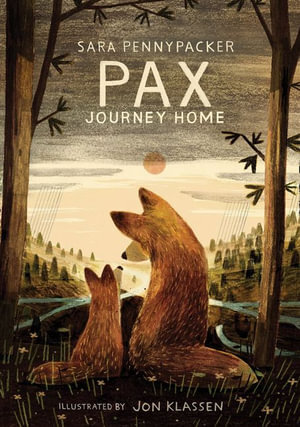 Pax: Journey Home, by Sara Pennypacker (Harper Collins, 2021). I was so pleased to see this book on the shelves. I read it’s predecessor, Pax, when I was in Vietnam a few years ago – buying it because of its amazing cover (by illustrator Jon Klassen). It’s a book that stayed with me, so to find a sequel at long last was exciting – and I wasn’t disappointed. During the war Peter had to release his pet fox, Pax, back into the wild and each struggled to adapt. Now, with the war over, Peter struggles with his new life and his guilt over letting Pax down. When they are reunited, it turns out they both can help each other.
Pax: Journey Home, by Sara Pennypacker (Harper Collins, 2021). I was so pleased to see this book on the shelves. I read it’s predecessor, Pax, when I was in Vietnam a few years ago – buying it because of its amazing cover (by illustrator Jon Klassen). It’s a book that stayed with me, so to find a sequel at long last was exciting – and I wasn’t disappointed. During the war Peter had to release his pet fox, Pax, back into the wild and each struggled to adapt. Now, with the war over, Peter struggles with his new life and his guilt over letting Pax down. When they are reunited, it turns out they both can help each other.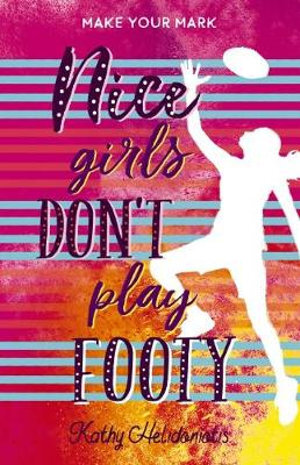 Nice Girls Don’t Play Footy, by Kathy Helidoniotis (Scholastic, 2019). This one had been in my to read pile for quite some time, and the week of the AFL grand final seemed a good time to pick it up. A story of a girl learning to love footy – and trying to find a way to play it against the wishes of her family and friends.No Flying in the House, by Betty Brock (Scholastic, 1970). I adored this book when I was a child,. Funnily, I didn’t remember the story very well – only that there was a tiny talking dog, and a girl who discovers she can fly. But in spite of not remembering the specifics, the memory of wanting to hug the book, and loving it, and talking about with my sister, who loved it too, have made me hold onto the copy I picked up second hand when my own children were young. And, finally, I picked it up and reread it. And I loved it again, which was a relief.Books for Young AdultsThe Boy From the Mish
Nice Girls Don’t Play Footy, by Kathy Helidoniotis (Scholastic, 2019). This one had been in my to read pile for quite some time, and the week of the AFL grand final seemed a good time to pick it up. A story of a girl learning to love footy – and trying to find a way to play it against the wishes of her family and friends.No Flying in the House, by Betty Brock (Scholastic, 1970). I adored this book when I was a child,. Funnily, I didn’t remember the story very well – only that there was a tiny talking dog, and a girl who discovers she can fly. But in spite of not remembering the specifics, the memory of wanting to hug the book, and loving it, and talking about with my sister, who loved it too, have made me hold onto the copy I picked up second hand when my own children were young. And, finally, I picked it up and reread it. And I loved it again, which was a relief.Books for Young AdultsThe Boy From the Mish
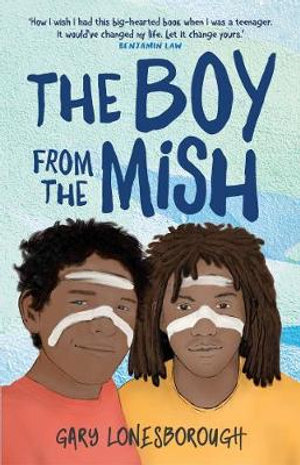 , by Gary Lonesborough (Allen & Unwin, 2021). A coming out and coming of age story. Jackson lives on the ‘mish’ a community outside a rural coastal town. When his Aunty brings another boy to visit for the summer holidays, Jackson confronts the knowledge that he is gay, and realises that fighting and hiding who he really is, is not a way forward. A tender, genuine read.
, by Gary Lonesborough (Allen & Unwin, 2021). A coming out and coming of age story. Jackson lives on the ‘mish’ a community outside a rural coastal town. When his Aunty brings another boy to visit for the summer holidays, Jackson confronts the knowledge that he is gay, and realises that fighting and hiding who he really is, is not a way forward. A tender, genuine read.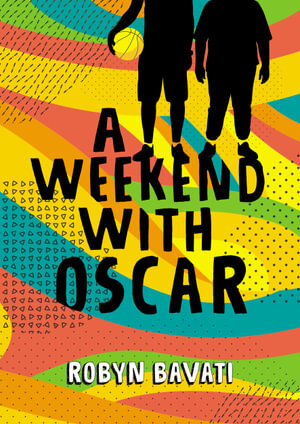 A Weekend With Oscar, by Robyn Bavati (Walker Books, 2021). life’s already tough for Jamie, with the death of his dad earlier in the year, but when his mother doesn’t return from a week away and he is left trying to care for his younger brother Oscar, who has Down syndrome, it gets increasingly difficult – especially as asking for help will risk them being separated.
A Weekend With Oscar, by Robyn Bavati (Walker Books, 2021). life’s already tough for Jamie, with the death of his dad earlier in the year, but when his mother doesn’t return from a week away and he is left trying to care for his younger brother Oscar, who has Down syndrome, it gets increasingly difficult – especially as asking for help will risk them being separated.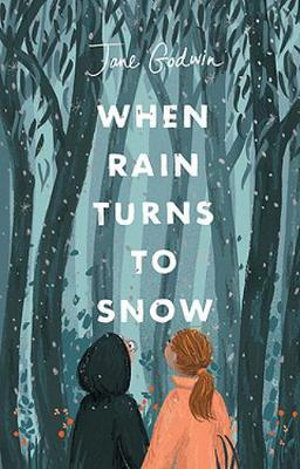 When Rain Turns to Snow, by Jane Godwin (Lothian, 2020). I read this when it came out last year, and then picked it up this month to recommend it to my uni students, and ended up rereading it over two nights. Lots of issues being explored here – family, adoption, online trolling and more – packaged in a story that makes it all palatable, so it isn’t issue-heavy.Books for Adults
When Rain Turns to Snow, by Jane Godwin (Lothian, 2020). I read this when it came out last year, and then picked it up this month to recommend it to my uni students, and ended up rereading it over two nights. Lots of issues being explored here – family, adoption, online trolling and more – packaged in a story that makes it all palatable, so it isn’t issue-heavy.Books for Adults 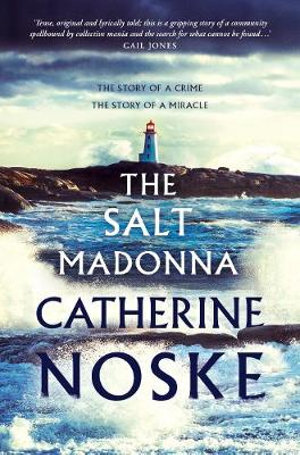 The Salt Madonna, by Catherine Noske (Picador, 2020). I purchased this at the Western Australia’s Premier’s Book Awards ceremony late last month. It was one of the shortlisted books which I hadn’t read, and the cover called to me. The story of a teacher returning to her island home to look after her dying mother, and confront her own past, as well as the struggling island community’s willingness to see miracles where perhaps there are none. I do like Australian gothic, and this was done well.
The Salt Madonna, by Catherine Noske (Picador, 2020). I purchased this at the Western Australia’s Premier’s Book Awards ceremony late last month. It was one of the shortlisted books which I hadn’t read, and the cover called to me. The story of a teacher returning to her island home to look after her dying mother, and confront her own past, as well as the struggling island community’s willingness to see miracles where perhaps there are none. I do like Australian gothic, and this was done well.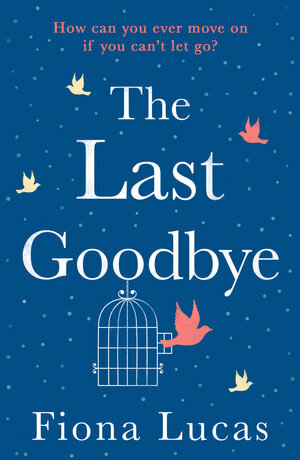 The Last Goodbye, Fiona Lucas (Harper Collins, 2021). I’m always interested in how other authors deal with topics of grief and loss, which is why I picked this one up. Anna is grieving her husband, killed in an accident, and rings his mobile number hoping to listen to his voice message. But someone answers – and soon she has a long distance friendship with Brody, who has a grief of his own. Part romance, part story of acceptance with a satisfying resolution.Poetry
The Last Goodbye, Fiona Lucas (Harper Collins, 2021). I’m always interested in how other authors deal with topics of grief and loss, which is why I picked this one up. Anna is grieving her husband, killed in an accident, and rings his mobile number hoping to listen to his voice message. But someone answers – and soon she has a long distance friendship with Brody, who has a grief of his own. Part romance, part story of acceptance with a satisfying resolution.Poetry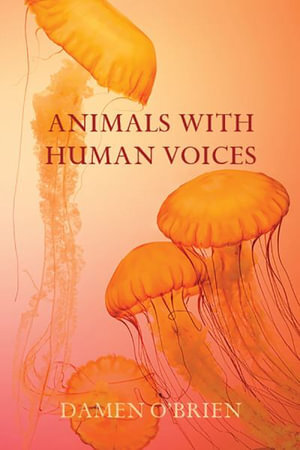 Animals With Human Voices, by Damen O’Brien (Recent Work Press, 2021). I bought this on the strength of its divine cover, which is stunning, isn’t it? The poetry inside didn’t disappoint either. Poems about animals, but more about people, and the climate change, and truth, and all kinds of things really.
Animals With Human Voices, by Damen O’Brien (Recent Work Press, 2021). I bought this on the strength of its divine cover, which is stunning, isn’t it? The poetry inside didn’t disappoint either. Poems about animals, but more about people, and the climate change, and truth, and all kinds of things really.Non-Fiction
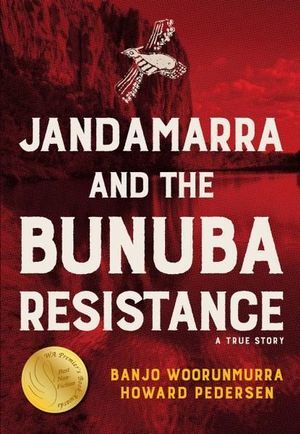 Jandamarra and the Bunubu Resistance, by Banjo Woorunmurra & Howard Pedersen (Magabala Books, 1996). I visited the West Kimberley this month, flying in and out of Broome, and, at the airport, looked for a book from Magabala Books, the local publisher. This one jumped out as me as I knew a little of Jandamarra’s story, but not enough. Not an easy book to read, and to be reminded of the terrible things colonialists did in our northwest – and elsewhere – in the name of progress. It made me angry and sad and a little bit helpless – but the book was well written and well researched and I had no trouble believing that these things happened. It’s confronting to know I live on lands stolen and with a such a terrible history of slavery and genocide, which many Australians still have trouble accepting. So I didn’t find this easy but I did find it necessary, because it is important to know and to question so that hopefully we can somehow make our country better.
Jandamarra and the Bunubu Resistance, by Banjo Woorunmurra & Howard Pedersen (Magabala Books, 1996). I visited the West Kimberley this month, flying in and out of Broome, and, at the airport, looked for a book from Magabala Books, the local publisher. This one jumped out as me as I knew a little of Jandamarra’s story, but not enough. Not an easy book to read, and to be reminded of the terrible things colonialists did in our northwest – and elsewhere – in the name of progress. It made me angry and sad and a little bit helpless – but the book was well written and well researched and I had no trouble believing that these things happened. It’s confronting to know I live on lands stolen and with a such a terrible history of slavery and genocide, which many Australians still have trouble accepting. So I didn’t find this easy but I did find it necessary, because it is important to know and to question so that hopefully we can somehow make our country better.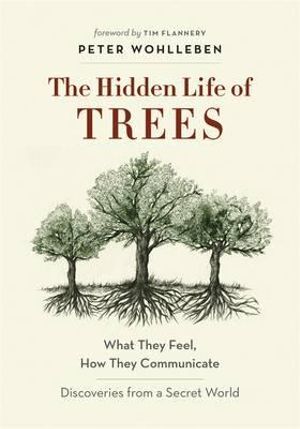 The Hidden Life of Trees, by Peter Wohlleben (Bollinda, 2016). Having read this, I will never look at trees in quite the same way. In spite of being (understandably, given that the author is German) focussed on European trees, I found this look at how trees communicate, make decisions and more fascinating. Listening on audio had an extra benefit – the reading (by Mike Grady) was lovely – almost like being read a soothing bedside story.
The Hidden Life of Trees, by Peter Wohlleben (Bollinda, 2016). Having read this, I will never look at trees in quite the same way. In spite of being (understandably, given that the author is German) focussed on European trees, I found this look at how trees communicate, make decisions and more fascinating. Listening on audio had an extra benefit – the reading (by Mike Grady) was lovely – almost like being read a soothing bedside story.This brings my total for 2021 to 119. I wonder if I can crack the 150 by the end of the year? Best get reading. What have you been reading?
September 6, 2021
What I Read in August
August was bookmonth and so my reading time was more limited – but I still managed to get thorugh eleven books. This is what I read:
Books for Children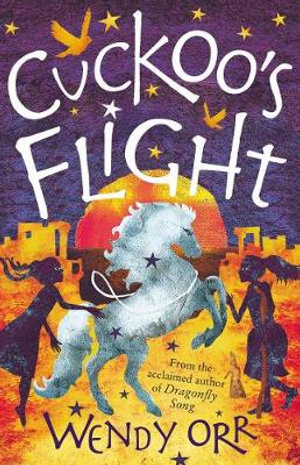 Cuckoo’s Flight, by Wendy Orr (Allen & Unwin, 2021). A wonderful complement to Orr’s two previous books set in the Bronze Age. Although each stands alone, I have enjoyed reading all three over the past few months and being immersed into the time period and into Orr’s beautiful writing.
Cuckoo’s Flight, by Wendy Orr (Allen & Unwin, 2021). A wonderful complement to Orr’s two previous books set in the Bronze Age. Although each stands alone, I have enjoyed reading all three over the past few months and being immersed into the time period and into Orr’s beautiful writing.
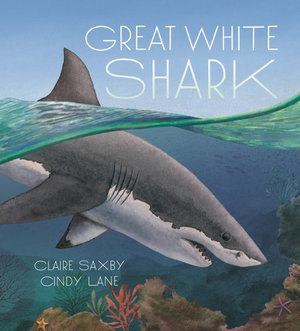 Great White Shark, by Claire Saxby & Cindy Lane (Walker Books 2021). I have been waiting for this picture book to come out for what seems forever. Written by by amazing friend Claire, one of Australia’s best writers of creative nonfiction of children (as well as other forms) and illustrated by another amazing friend Cindy, who is a debut illustrator but established artist, this book is as amazing as I expected. How’s that for an unbiased review? Okay, maybe a tiny bit biased, but heartfelt.
Great White Shark, by Claire Saxby & Cindy Lane (Walker Books 2021). I have been waiting for this picture book to come out for what seems forever. Written by by amazing friend Claire, one of Australia’s best writers of creative nonfiction of children (as well as other forms) and illustrated by another amazing friend Cindy, who is a debut illustrator but established artist, this book is as amazing as I expected. How’s that for an unbiased review? Okay, maybe a tiny bit biased, but heartfelt.  Mina and the Whole Wide World, by Sherryl Clark, with art by Briony Stewart (UQP, 2021). Always love a verse novel, and when it’s written by Sherryl Clark I know it will be brilliant. This is a gentle story about belonging, friendship and family. the illustrations are gorgeous, too.
Mina and the Whole Wide World, by Sherryl Clark, with art by Briony Stewart (UQP, 2021). Always love a verse novel, and when it’s written by Sherryl Clark I know it will be brilliant. This is a gentle story about belonging, friendship and family. the illustrations are gorgeous, too.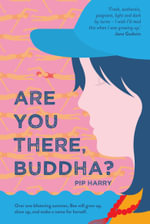 Are You There, Buddha? by Pip Harry (Lothian, 2021) . Another verse novel, this time for a middle grade readership and exploring issues really important for this age group, including first periods, peer pressure, self identity and family. That sounds a lot, but it’s woven together in a lovely story.
Are You There, Buddha? by Pip Harry (Lothian, 2021) . Another verse novel, this time for a middle grade readership and exploring issues really important for this age group, including first periods, peer pressure, self identity and family. That sounds a lot, but it’s woven together in a lovely story.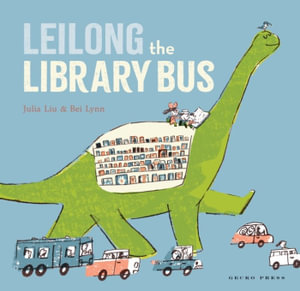 Leilong the Library Bus, by Julia Liu & Bei Lynn (Gecko Press, 2021). gecko press always produced quirky books that make me smile. This one is no exception – about a dinosaur who desperately wants to go to the library with his human friends, but is just too big to go inside. It takes a manager changing their perspective to find a solution – Leilong becomes a library bus!
Leilong the Library Bus, by Julia Liu & Bei Lynn (Gecko Press, 2021). gecko press always produced quirky books that make me smile. This one is no exception – about a dinosaur who desperately wants to go to the library with his human friends, but is just too big to go inside. It takes a manager changing their perspective to find a solution – Leilong becomes a library bus! The Elephant, by Peter Carnavas (UQP, 2017). This is one I’ve been meaning to read ever since it came out, and I finally got my hands on a copy this month, and read it in one sitting. Carnavas has a gentle and quirky way of both writing and illustrating, that means he handles some difficult topics really well, and in this, his first novel, he deals with grief and depression in a way accessible to children, and adults too. Lovely.
The Elephant, by Peter Carnavas (UQP, 2017). This is one I’ve been meaning to read ever since it came out, and I finally got my hands on a copy this month, and read it in one sitting. Carnavas has a gentle and quirky way of both writing and illustrating, that means he handles some difficult topics really well, and in this, his first novel, he deals with grief and depression in a way accessible to children, and adults too. Lovely.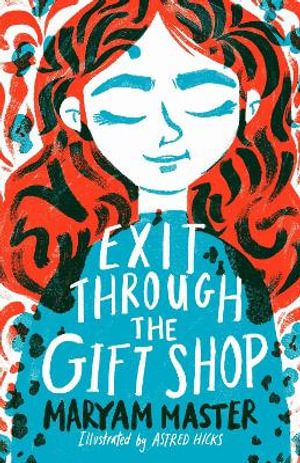 Exit Through the Gift Shop, by Maryam Master, illustrated by Astrid Hicks (Pan, 2021). I loved this one. It deals with a really difficult topic – the narrator, Anahita, his dying of cancer – with a wonderful blend of humour and realism. Not an easy subject to deal with in a palatable way, but I think Master nails it.
Exit Through the Gift Shop, by Maryam Master, illustrated by Astrid Hicks (Pan, 2021). I loved this one. It deals with a really difficult topic – the narrator, Anahita, his dying of cancer – with a wonderful blend of humour and realism. Not an easy subject to deal with in a palatable way, but I think Master nails it.Books for Young Adults
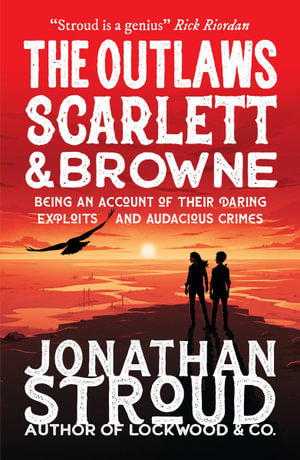 The Outlaws Scarlett & Browne (Walker Books, 2021). It took me a little while to get into this one, but that may have bene the busy week I was having. Set in a post apocalyptic future Britain, where lawlessness reigns, and nobody is safe from wild beasts, gangs and damaged people. Scarlett and Browne are an unlikely pair who travel across the country robbing banks and avoiding abduction, gradually finding they can rely on each other to escape almost every situation.Books for Adults
The Outlaws Scarlett & Browne (Walker Books, 2021). It took me a little while to get into this one, but that may have bene the busy week I was having. Set in a post apocalyptic future Britain, where lawlessness reigns, and nobody is safe from wild beasts, gangs and damaged people. Scarlett and Browne are an unlikely pair who travel across the country robbing banks and avoiding abduction, gradually finding they can rely on each other to escape almost every situation.Books for Adults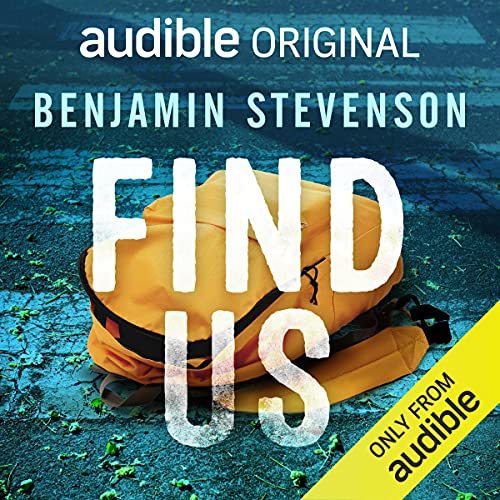 Find Us, by Benjamin Stevenson (Audible, 2020). This was an Audible original and a free download. As I’ve said in previous posts, I quite like the free extras that Audible offers, which exposes me to authors and genres I might not otherwise read. This is a psychological thriller, and a wee bit disturbing – but in a way that was well put together and had twists and turns that kept me guessing.
Find Us, by Benjamin Stevenson (Audible, 2020). This was an Audible original and a free download. As I’ve said in previous posts, I quite like the free extras that Audible offers, which exposes me to authors and genres I might not otherwise read. This is a psychological thriller, and a wee bit disturbing – but in a way that was well put together and had twists and turns that kept me guessing. Love Objects, by Emily Maguire (Allen & Unwin, 2021). A complex, engaging story of family. Nic is a trivia-buff, cat-loving hoarder. Her niece Lena is her closest friend, but is struggling with issues of her own, including the fall out from a terrible betrayal by a rich boy classmate. When Nic is injured, their relationship is challenged and the family’s past troubles resurface. I really enjoyed the way Maguire balances some difficult topics with endearing characters.
Love Objects, by Emily Maguire (Allen & Unwin, 2021). A complex, engaging story of family. Nic is a trivia-buff, cat-loving hoarder. Her niece Lena is her closest friend, but is struggling with issues of her own, including the fall out from a terrible betrayal by a rich boy classmate. When Nic is injured, their relationship is challenged and the family’s past troubles resurface. I really enjoyed the way Maguire balances some difficult topics with endearing characters. After Story, by Larissa Behrendt (UQP, 2021). This is the beautiful story of a mother and daughter travelling together and, though it isn’t planned that way, healing some of their old wounds. Della has never recovered from the abduction of one of her children. More recently, her partner has died. Her youngest daughter Jasmine takes her along on a trip to England to visit places connected with stories Della has never read, by authors she hasn’t heard of. Gradually, though, these places help her confront the past and find a path forward.
After Story, by Larissa Behrendt (UQP, 2021). This is the beautiful story of a mother and daughter travelling together and, though it isn’t planned that way, healing some of their old wounds. Della has never recovered from the abduction of one of her children. More recently, her partner has died. Her youngest daughter Jasmine takes her along on a trip to England to visit places connected with stories Della has never read, by authors she hasn’t heard of. Gradually, though, these places help her confront the past and find a path forward.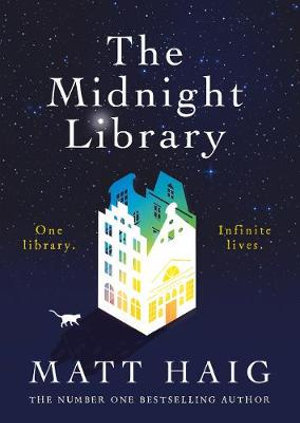 The Midnight Library, by Matt Haig (Audible, 2020). I listened to this one on Audible – the free Member’s Extra download this month. The story of Nora who, lonely, unemployed and seemingly without hope, decides to take her own life. She finds herself between life and death in a library where she confronts her regrets and has an opportunity to sample other versions of her life. If she finds the perfect one, she is promised, she will be able to live out that life. An interesting take on a potentially grim topic.Playing With the Grown-Ups, by Sophie Dahl (Bloomsbury, 2007). I picked this one up on a charity table outside by local Coles and read it in a couple of days. It’s the story of teenager Kitty whose life is dominated by the whims of her artistic, but irresponsible, mother, who moves between rural England, America, and London, taking Kitty and her younger siblings along for the ride, and forcing Kitty to grow up much faster than she might like.
The Midnight Library, by Matt Haig (Audible, 2020). I listened to this one on Audible – the free Member’s Extra download this month. The story of Nora who, lonely, unemployed and seemingly without hope, decides to take her own life. She finds herself between life and death in a library where she confronts her regrets and has an opportunity to sample other versions of her life. If she finds the perfect one, she is promised, she will be able to live out that life. An interesting take on a potentially grim topic.Playing With the Grown-Ups, by Sophie Dahl (Bloomsbury, 2007). I picked this one up on a charity table outside by local Coles and read it in a couple of days. It’s the story of teenager Kitty whose life is dominated by the whims of her artistic, but irresponsible, mother, who moves between rural England, America, and London, taking Kitty and her younger siblings along for the ride, and forcing Kitty to grow up much faster than she might like.That brings my total for the year to 108 books, so far. What have you been reading?
August 20, 2021
Making Poetry a Pleasure
One of my long standing goals as a poet and as an educator has been to find ways to get more poetry into the hands of hearts of Australian children. So, when I was approached by PETAA (the Primary English Teacher’s Association) to put together a resource for Australian teachers, I said yes. A very enthusiastic yes. A yes which I may have briefly regretted when I realised the very tight deadline – I was approached in February, and it needed to be finished by May.
But, in spite of a that super-tight deadline, I am really thrilled that this week PETAA members all over Australia (and some further afield) have received their member’s pack, with my little offering inside.
And, today, my own member’s pack arrived, plus a second parcel with more copies just for me.
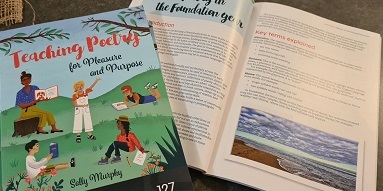
Teaching Poetry for Pleasure and Purpose includes:
practical activities for teaching poetry across the primary school years, linked to the curriculum.definitions and examples of key poetic terms and concepts poems (of course) – some are by me, some are by other wonderful poetslots of resource suggestionsan introduction by THE Jackie French. How good is that?Oh – and something exciting for me is that some of own photos appear in the book – you can spot one in the image above – a photo of my beach!
Of course most exciting of all is the thought that teachers will find the book helpful for teaching poetry – and that kids will benefit from the pleasure of reading and writing poetry. If you are not a PETAA member, don’t worry – you can still buy the book direct from PETAA.

What an Honour!
It’s Bookweek, and that means today was announcement day for the Children’s Book Council of Australian Children’s Book of the Year Awards. And…..
(pausing here for dramatic effect)
Worse Things was named an Honour Book!!!!
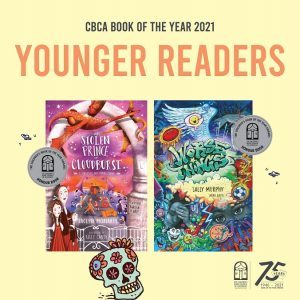
I am excited and chuffed and happy and, well, honoured.
There may have been a few happy teams today. Worse Things, like all my books, means a lot to me. And this was one was a bit of a hard sell when it came to getting it over the line for publication. But Walker Books took a chance, Sarah Davis made it look a-maaaaaaaa-zing, and, it seems readers are loving it.
I may or not be heading out to have a glass of champagne this evening with fellow West Australian book people, including fellow West Australian winners. at the CBCA Western Australian branch Bookweek dinner.
Dreams come true. Have a wonderful Book Week. Stay safe. Keep reading. And thank you because, if you are reading this, you are part of my writing journey!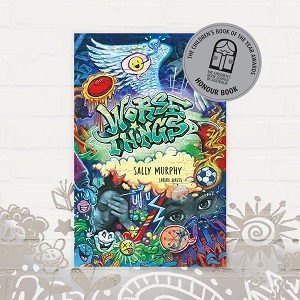
PS. I should, of course, have mentioned the other winners. So many talented creators and amazing books in the winners list as well as on the shortlist and notable list. Head to the CBCA website for all the details – and get reading!



